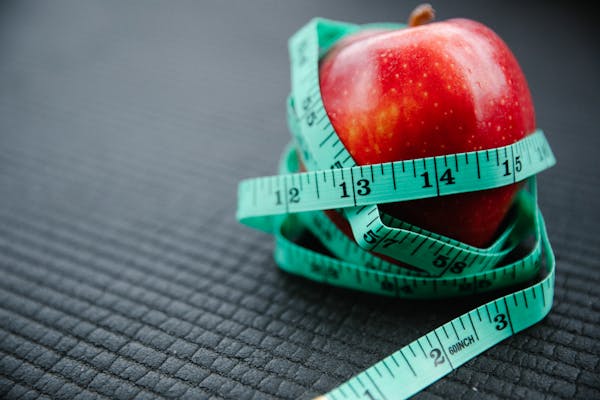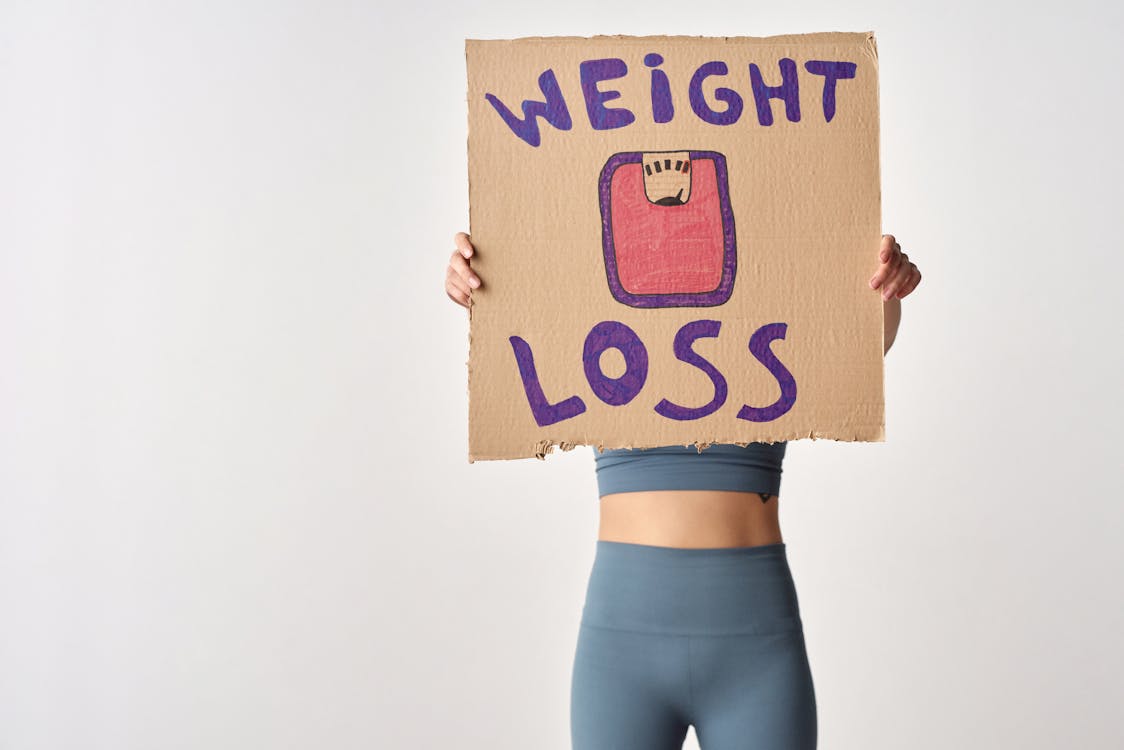
To lose weight fast and safely requires a combination of healthy eating, regular physical activity, and adopting sustainable lifestyle changes. While it’s important to aim for gradual and sustainable weight loss, here are some tips to help you on your journey:
1- Set realistic goals to Lose Weight Fast:
Setting realistic goals is crucial when it comes to lose weight fast. Instead of expecting overnight transformations, it’s important to adopt a long-term approach that focuses on sustainable changes. Aim to lose 1-2 pounds (0.5-1 kg) per week, as this gradual rate of weight loss is not only more achievable but also healthier for your body. Rapid weight loss can lead to muscle loss, nutrient deficiencies, and a higher chance of weight regain. By setting realistic goals, you allow yourself the time and space to make lasting lifestyle changes that will contribute to your overall well-being. Remember, slow and steady wins the race when it comes to lose weight fast.
2- To Lose Weight Fast Create a Calorie Deficit:
Creating a calorie deficit is an important aspect of weight loss. To shed pounds, you must consume fewer calories than your body burns on a daily basis. Here are some key points to consider:
- Determine your daily calorie needs: Calculate your basal metabolic rate (BMR), which is the number of calories your body needs to maintain basic functions at rest. Then, consider your activity level to estimate your total daily energy expenditure (TDEE). Several online calculators and formulas are available to help you determine these values.
- Reduce calorie intake: Start by making small, sustainable changes to your eating habits. Focus on reducing portion sizes, choosing lower-calorie options, and incorporating more nutrient-dense foods into your diet. Opt for lean proteins, whole grains, fruits, vegetables, and healthy fats. Be mindful of calorie-dense foods and beverages, such as sugary snacks, processed foods, and sugary drinks, as they can contribute to weight gain.
- Increase physical activity: Alongside adjusting your calorie intake, you can create a calorie deficit by increasing your physical activity. Engage in regular exercise and aim for a combination of cardiovascular workouts and strength training exercises. Cardio exercises, like jogging, swimming, or cycling, help burn calories, while strength training builds muscle, which can increase your resting metabolic rate and help with long-term weight management.
- Avoid extremely low-calorie diets: While it may be tempting to drastically cut calories for rapid weight loss, extremely low-calorie diets (typically below 800 calories per day) can be unsafe and unsustainable. Such diets may lead to nutrient deficiencies, muscle loss, a slowed metabolism, and potential health risks. It’s important to provide your body with adequate nutrition while gradually creating a moderate calorie deficit.
- Monitor your progress: Keep track of your calorie intake and expenditure to ensure you’re maintaining a calorie deficit. You can use various tools and apps that help you track your food intake, calculate calorie values, and monitor your physical activity.
- Seek professional guidance if needed: If you’re unsure about determining your calorie needs, creating a calorie deficit, or managing your diet and exercise regimen, it’s advisable to consult with a registered dietitian or nutritionist. They can provide personalized guidance and support to help you achieve your weight loss goals safely and effectively.

Remember, sustainable weight loss is a gradual process. Aim for a moderate calorie deficit, prioritize nutrient-dense foods, and adopt healthy lifestyle habits that you can maintain in the long run. It’s important to focus on overall well-being rather than solely on the number on the scale.
3- Eat a Balanced Diet to Lose Weight Fast:
Eating a balanced diet is essential for both weight loss and overall health. Here are some key points to consider when it comes to maintaining a balanced and nutritious eating plan to lose weight fast:
- Whole, unprocessed foods: Base your diet on whole foods that are minimally processed. These foods are typically nutrient-dense and provide a wide range of essential vitamins, minerals, and fiber. Examples include fruits, vegetables, whole grains, lean proteins, nuts, and seeds.
- Fruits and vegetables: Aim to include a variety of colorful fruits and vegetables in your daily meals. They are rich in vitamins, minerals, antioxidants, and fiber, which support overall health and weight management. Try to fill half of your plate with non-starchy vegetables like leafy greens, broccoli, bell peppers, and cauliflower.
- Lean proteins: Incorporate lean sources of protein into your meals. Good options include skinless poultry, fish, lean cuts of meat, tofu, legumes, and low-fat dairy products. Protein helps keep you full, supports muscle growth and repair, and contributes to a balanced diet.
- Whole grains: Choose whole grains over refined grains whenever possible. Whole grains like quinoa, brown rice, oats, and whole wheat bread are higher in fiber and provide more sustained energy. They can help you feel full and satisfied while providing essential nutrients.
- Healthy fats: Include sources of healthy fats in your diet, such as avocados, nuts, seeds, and olive oil. These fats are important for satiety, brain function, and overall health. However, be mindful of portion sizes, as fats are calorie-dense.
- Limit processed and sugary foods: Inorder to lose weight fast, minimize your consumption of processed snacks, sugary drinks, and foods high in saturated fats and added sugars. These foods tend to be high in calories, low in nutrients, and can contribute to weight gain and various health problems.
- Portion control: Pay attention to portion sizes to avoid overeating. Use smaller plates and bowls to help control portion sizes visually. Practice mindful eating by savoring your meals and listening to your body’s hunger and fullness cues.
- Hydration: Drink plenty of water throughout the day. It helps keep you hydrated, supports digestion, and can help control your appetite. Limit or avoid sugary drinks like soda and fruit juices, as they are high in calories and offer little nutritional value.
- Meal planning and preparation: Plan your meals in advance and prepare homemade meals whenever possible. This allows you to have better control over the ingredients and portion sizes. It also helps prevent reliance on unhealthy takeout or processed convenience foods.
Remember, balance and moderation are key. Allow yourself the occasional treat or indulgence while primarily focusing on nourishing your body with whole, nutrient-dense foods. Adopting a balanced diet not only supports weight loss but also promotes overall well-being and long-term healthy habits.
4- Control Portion Sizes to Lose Weight Fast:
Controlling portion sizes is an important aspect of weight management. Here are some strategies to help you practice portion control effectively:
- Be mindful of your eating environment: When you sit down to eat, minimize distractions like television or mobile devices. By focusing on your meal, you’ll be more aware of your portion sizes and your body’s signals of hunger and fullness.
- Use smaller plates and bowls: Opt for smaller plates and bowls when serving your meals. Research shows that people tend to eat less when their food portions appear larger on smaller plates. This visual trick can help you feel satisfied with smaller amounts of food.
- Serve yourself appropriate portions: Instead of eating directly from a large container or bag, portion out your food onto a plate or bowl. This allows you to have a better understanding of how much you’re consuming. Use measuring cups or a food scale to learn what proper portions look like for different food groups.
- Fill up on vegetables: Start your meals by filling half of your plate with non-starchy vegetables like leafy greens, broccoli, or carrots. These nutrient-rich foods are low in calories and high in fiber, helping you feel full and satisfied without overdoing the calorie intake.
- Listen to your body’s hunger and fullness cues: Pay attention to your body’s signals of hunger and fullness. Eat slowly and savor each bite, allowing your brain to register when you’re satisfied. Stop eating before you feel completely full, as it takes some time for your body to recognize fullness.
- Be aware of liquid calories: Beverages can contribute a significant amount of calories to your daily intake. Be mindful of sugary drinks, alcohol, and even certain fruit juices. Opt for water, unsweetened tea, or infused water to stay hydrated without adding unnecessary calories.
- Plan and prepare meals in advance: By planning your meals and snacks in advance, you can avoid impulsive eating and better manage portion sizes. Preparing your own meals allows you to have control over ingredients and portion sizes, making it easier to lose weight fast.
- Practice portion control when dining out: When eating at restaurants, it can be challenging to control portion sizes, as servings tend to be larger. Consider sharing a meal with a dining partner or ask for a to-go box and portion out half of your meal before you start eating. Additionally, you can choose healthier options from the menu, such as salads, grilled proteins, or vegetable-based dishes.

Remember, portion control is about finding the balance that works for you. It may take some practice and adjustment, but being mindful of your portion sizes and listening to your body’s cues can help you achieve and maintain a healthy weight.
5- To Lose Weight Fast, Stay hydrated:
Staying hydrated is essential for overall health and can also support your weight loss efforts. Here’s why hydration is important and how you can maintain proper hydration:
- Support body functions: Water is involved in numerous vital functions of the body, including digestion, nutrient absorption, circulation, regulation of body temperature, and waste removal. Staying hydrated ensures that these processes can occur efficiently.
- Appetite control: Sometimes we mistake thirst for hunger. When you’re dehydrated, your body may send signals that mimic hunger cues. By drinking an adequate amount of water, you can help differentiate between true hunger and thirst, which may prevent unnecessary snacking and overeating.
- Boost metabolism: Research suggests that drinking water may temporarily increase your resting metabolic rate. Staying hydrated can help support your body’s calorie-burning potential, although the effect is modest.
- Optimal exercise performance: Proper hydration is crucial for maintaining physical performance during exercise. When you’re well-hydrated, you have better endurance, improved cardiovascular function, and enhanced muscle function. This can help you engage in more effective workouts and burn more calories.
- Calorie-free beverage choice: Water is a calorie-free drink option that can replace high-calorie beverages like sugary sodas, juices, or energy drinks. By choosing water over calorie-dense drinks, you can reduce your overall calorie intake and support your efforts to lose weight fast.
To stay properly hydrated:
- Drink water regularly throughout the day. Aim for at least 8 cups (64 ounces) of water daily, but individual needs may vary.
- Carry a reusable water bottle with you as a reminder to drink water and make it easily accessible.
- Listen to your body’s thirst cues and drink water when you feel thirsty.
- Drink water before, during, and after exercise to replenish fluids lost through sweat.
- If you struggle with plain water, infuse it with slices of fruits, herbs, or cucumbers to add flavor without adding calories.
- Be aware of factors that may increase your fluid needs, such as hot weather, intense physical activity, or certain medications.
- Limit or avoid sugary drinks, as they can contribute to weight gain and provide little nutritional value.
Remember, individual hydration needs can vary depending on factors like age, sex, activity level, and overall health. It’s always a good idea to consult with a healthcare professional for personalized recommendations regarding hydration.
6- Regular Physical Activity to Lose Weight Fast:
Regular physical activity is a crucial component of a successful weight loss journey. Here’s why incorporating exercise into your routine is important and how you can make it a part of your lifestyle:
- Calorie burning: Engaging in physical activity helps burn calories, contributing to creating a calorie deficit necessary for weight loss. The more intense the activity, the more calories you’ll burn. However, even moderate-intensity exercises like brisk walking or cycling can have significant benefits.
- Increased metabolism: Regular exercise can boost your metabolism, both during and after your workout. This means your body continues to burn calories even after you’ve finished exercising, which can aid in weight loss efforts.
- Preserving muscle mass: When you lose weight fast, there’s a risk of losing muscle along with fat. Incorporating strength training exercises into your routine helps preserve and build lean muscle mass. Muscle is metabolically active and can help increase your resting metabolic rate, allowing you to burn more calories throughout the day.
- Improved cardiovascular health: Physical activity strengthens your heart, improves circulation, and reduces the risk of cardiovascular diseases. It enhances your overall fitness level and increases your endurance, making daily activities easier to perform.
- Mood enhancement and stress reduction: Exercise stimulates the release of endorphins, which are natural mood boosters. Regular physical activity can help reduce stress, anxiety, and symptoms of depression, contributing to overall well-being.
To incorporate regular physical activity into your weight loss journey:
- Choose activities you enjoy: Find physical activities that you genuinely enjoy, whether it’s jogging, dancing, swimming, cycling, or playing a sport. This increases the likelihood that you’ll stick to your exercise routine.
- Set realistic goals: Start with manageable goals and gradually increase the intensity and duration of your workouts over time. This helps prevent injury and keeps you motivated.
- Make it a habit: Schedule regular exercise sessions into your weekly routine. Consistency is key, so aim for at least 150 minutes of moderate-intensity aerobic activity or 75 minutes of vigorous-intensity aerobic activity per week, along with strength training exercises at least twice a week.
- Mix it up: Include a variety of activities to keep your workouts interesting and challenge different muscle groups. This also helps prevent boredom and plateaus.
- Stay active throughout the day: Look for opportunities to be active throughout your day, such as taking the stairs instead of the elevator, going for walks during breaks, or doing household chores. Every bit of activity adds up.
- Seek support and accountability: Consider working out with a friend, joining group fitness classes, or hiring a personal trainer to provide guidance, support, and accountability.

Remember, it’s essential to consult with a healthcare professional before starting any new exercise program, especially if you have any underlying health conditions or concerns. They can provide personalized recommendations based on your individual needs and help you design a safe and effective exercise plan.
7- Get Enough Sleep to Lose Weight Fast:
Getting enough sleep is an often overlooked but crucial factor to lose weight fast successfully and overall well-being. Here’s why prioritizing sleep is important and how you can ensure you’re getting adequate rest:
- Hormone regulation: Sleep plays a vital role in hormone regulation, particularly those related to appetite and satiety. Lack of sleep can disrupt the balance of hormones like leptin and ghrelin, which can lead to increased appetite and cravings, making it harder to stick to a healthy eating plan.
- Energy balance: Sufficient sleep contributes to maintaining a healthy energy balance. When you’re well-rested, you have more energy to engage in physical activity and make healthier food choices. On the other hand, inadequate sleep can leave you feeling tired and lethargic, making it difficult to stay active and motivated.
- Metabolism and weight management: Chronic sleep deprivation has been linked to a slower metabolism, insulin resistance, and an increased risk of weight gain and obesity. Quality sleep supports metabolic processes, including glucose regulation and energy expenditure, which are important for weight management.
- Cravings and emotional eating: Lack of sleep can lead to increased cravings for high-calorie, sugary, and fatty foods. Sleep deprivation affects the brain’s reward system, making it more challenging to resist unhealthy food choices. Additionally, inadequate sleep can affect emotional regulation, leading to an increased likelihood of turning to food for comfort or stress relief.
- Recovery and muscle growth: Sleep is an essential time for your body to recover and repair itself. During sleep, the body releases growth hormone, which aids in muscle repair and growth. Sufficient sleep supports exercise recovery, allowing you to perform better during workouts and build lean muscle mass.
To prioritize sleep for weight loss and overall well-being:
- Establish a consistent sleep schedule: Try to go to bed and wake up at the same time each day, even on weekends. This helps regulate your body’s internal clock and promotes better sleep quality.
- Create a sleep-friendly environment: Make your bedroom conducive to sleep by keeping it cool, dark, and quiet. Use comfortable bedding and ensure proper ventilation.
- Develop a bedtime routine: Engage in relaxing activities before bed to signal to your body that it’s time to wind down. This could include reading, taking a warm bath, practicing meditation or deep breathing exercises, or listening to calming music.
- Limit exposure to screens before bed: The blue light emitted by electronic devices can interfere with your sleep quality. Avoid screens, such as smartphones, tablets, and computers, for at least an hour before bed. Instead, engage in relaxing activities.
- Limit caffeine and alcohol intake: Caffeine can disrupt sleep, so avoid consuming it late in the day. While alcohol may initially make you drowsy, it can disrupt sleep patterns and negatively impact the quality of your rest.
- Create a sleep-friendly bedtime routine: Engage in relaxing activities before bed to signal to your body that it’s time to wind down. This could include reading, taking a warm bath, practicing meditation or deep breathing exercises, or listening to calming music.
- Prioritize stress management: Stress can negatively affect sleep quality. Incorporate stress management techniques into your daily routine, such as exercise, mindfulness, or journaling, to promote better sleep.
- Consult a healthcare professional if needed: If you consistently struggle with sleep or suspect you have a sleep disorder, it’s advisable to consult a healthcare professional for further evaluation and guidance.
Remember, the recommended amount of sleep varies for individuals, but most adults generally require 7-9 hours of quality sleep each night. Prioritizing sleep as part of your weight loss journey can improve your overall well-being, support your efforts to lose weight fast, and enhance your ability to make healthier choices throughout the day.
8- Manage Stress to Lose Weight Fast:
Managing stress is an important aspect of weight loss management and overall well-being. Here’s why stress management is crucial and some strategies to help you effectively manage stress:
- Impact on weight and eating habits: Chronic stress can contribute to weight gain and difficulties with weight loss. Stress triggers the release of cortisol, a hormone that can increase appetite and cravings, particularly for unhealthy, high-calorie foods. By managing stress, you can help prevent emotional eating and make more mindful choices.
- Emotional well-being: Stress can negatively impact your emotional well-being, leading to feelings of anxiety, irritability, and low mood. By managing stress, you can improve your overall mental health and create a positive mindset that supports your goals to lose weight fast.
- Sleep quality: Stress can disrupt sleep patterns, making it difficult to get restful sleep. Lack of quality sleep can further exacerbate stress levels, creating a vicious cycle. Effective stress management techniques can help improve sleep quality, allowing you to feel more refreshed and energized.
- Consistency and adherence: Stress can make it challenging to maintain consistency and adherence to healthy habits. By managing stress, you can enhance your ability to stick to your weight loss plan, including regular exercise, healthy eating, and self-care practices.

To effectively manage stress:
- Identify stress triggers: Become aware of the situations, events, or factors that contribute to your stress levels. This self-awareness can help you develop strategies to address and minimize stressors.
- Practice relaxation techniques: Engage in relaxation techniques that work for you, such as deep breathing exercises, meditation, yoga, or progressive muscle relaxation. These techniques can help calm your mind and body, reduce stress levels, and promote overall well-being.
- Exercise regularly: Physical activity is not only beneficial for weight loss but also for stress reduction. Engaging in regular exercise helps release endorphins, which are natural mood enhancers. Find activities you enjoy and make them a part of your routine.
- Prioritize self-care: Take time for activities that help you unwind and recharge. This could include hobbies, spending time with loved ones, reading, taking baths, listening to music, or engaging in creative outlets. Prioritizing self-care activities can help reduce stress and improve your overall well-being.
- Practice mindfulness: Mindfulness involves being present at the moment and non-judgmentally observing your thoughts and feelings. Mindfulness techniques, such as mindful eating, meditation, or simply taking a few minutes to focus on your breath, can help reduce stress and increase self-awareness.
- Seek social support: Connect with others who can provide emotional support and understanding. Share your feelings and experiences with trusted friends, family members, or support groups. Sometimes, talking through your stress can help alleviate its impact.
- Time management and organization: Effective time management can help reduce stress by allowing you to prioritize tasks, set realistic goals, and create a balanced schedule. Break down larger tasks into smaller, manageable steps to avoid feeling overwhelmed.
- Seek professional help if needed: If stress becomes overwhelming or persists despite your efforts to manage it, consider seeking support from a mental health professional. They can provide guidance, strategies, and coping techniques tailored to your individual needs.
Remember, stress management is a personal journey, and different techniques work for different people. It may take some trial and error to find what works best for you. By implementing effective stress management strategies, you can improve your overall well-being, support your goals to lose weight fast, and create a healthier and more balanced lifestyle.
9- Monitor Your Progress to Lose Weight Fast:
Monitoring your progress is a valuable practice during your weight loss journey. Here’s why tracking your progress is important and how you can effectively monitor your achievements:
- Accountability: Tracking your progress holds you accountable for your goals and commitments. By regularly monitoring your efforts, you’re more likely to stay on track and make necessary adjustments to your weight loss plan.
- Motivation: Seeing progress can provide a significant boost of motivation and reinforce your commitment to your goals to lose weight fast. It allows you to celebrate your achievements, no matter how small, and serves as a reminder of the positive changes you’re making.
- Identifying patterns and trends: Monitoring your progress helps you identify patterns and trends that may impact your weight loss. It allows you to understand what works best for your body and make informed decisions about your diet and exercise routine.
- Adjusting your approach: Regular monitoring enables you to evaluate the effectiveness of your weight loss strategies. If you’re not seeing the desired results, you can make necessary adjustments to your calorie intake, exercise intensity, or other aspects of your plan.
Here are some effective ways to monitor your progress:
- Weigh-ins: Regularly weigh yourself to track changes in your body weight. Choose a consistent day and time for weighing, and be mindful of fluctuations due to factors like water retention or menstrual cycles. Remember that weight is just one measure of progress, and other factors like body composition and how you feel should also be considered.
- Measurements: Take body measurements periodically to track changes in your waist, hips, thighs, and other areas. Sometimes, even if the scale doesn’t show significant weight loss, you may notice changes in inches lost.
- Photos: Take “before” photos at the start of your weight loss journey and periodically capture your progress by taking follow-up photos. Visual comparisons can be a powerful tool to recognize changes in your body shape and overall appearance.
- Clothing fit: Pay attention to how your clothes fit over time. If you notice that your clothes are becoming looser or you need to size down, it’s a positive sign of progress.
- Journaling: Keep a journal to record your food intake, exercise routines, emotions, and any challenges or victories you experience. This can help you identify patterns, triggers, and behaviors that may impact your weight loss progress.
- Progress apps or websites: Use technology to your advantage by utilizing various apps or websites that allow you to track your food intake, exercise, and overall progress. These tools often provide visual charts and graphs to help you visualize your journey.
- Set milestones: Break down your weight loss goal into smaller milestones or targets. Celebrate your achievements when you reach these milestones, as it can provide a sense of accomplishment and motivation to continue.
Remember, monitoring your progress should be done with a healthy and balanced mindset. Weight loss journeys can have ups and downs, and it’s essential to focus on overall well-being and sustainable changes rather than just the numbers on a scale. If you find that tracking your progress becomes stressful or obsessive, it’s important to reassess your approach and seek support if needed.

10- Seek Support to Lose Weight Fast:
Seeking support is a crucial aspect of a successful weight loss journey. Here’s why seeking support is important and how you can find the right support system:
- Accountability: Having a support system can provide you with the accountability you need to stay committed to your weight loss goals. When others are aware of your goals and progress, it can motivate you to stay on track and make healthier choices.
- Emotional support: Lose Weight Fast can be emotionally challenging at times, and having a supportive network can provide emotional encouragement and understanding. They can offer a listening ear, celebrate your successes, and help you navigate any setbacks or obstacles you may encounter.
- Knowledge and guidance: Support systems can offer valuable knowledge, guidance, and advice. They may have insights into effective weight loss strategies, nutrition information, or exercise tips. Learning from others’ experiences and expertise can enhance your own journey.
- Motivation and inspiration: Surrounding yourself with individuals who are also pursuing weight loss goals or living a healthy lifestyle can provide motivation and inspiration. Sharing achievements, milestones, and success stories can help you stay motivated and inspired to continue working towards your goals.
- Accountability: Joining a support group or finding an accountability partner can help you stay on track with your weight loss efforts. They can provide encouragement, share experiences, and hold you accountable for your actions.
Here are some ways to seek support:
- Friends and family: Share your weight loss goals with close friends and family members. They can offer support, and encouragement, and be a source of motivation. Engage them in your journey by involving them in physical activities or cooking healthy meals together.
- Join a weight loss program: Consider joining a structured weight loss program that offers professional guidance and a supportive community. These programs often provide resources, meal plans, and regular check-ins to help you stay accountable and motivated.
- Online communities: Look for online communities and forums dedicated to weight loss or healthy living. These communities can provide a space for you to share your experiences, ask questions, and connect with individuals who are on a similar journey.
- Support groups: Join local or online support groups specifically focused on weight loss or healthy lifestyle changes. These groups provide a supportive environment where you can share challenges, gain insights, and find encouragement from others who are going through similar experiences.
- Seek professional help: If you’re struggling with the emotional or psychological aspects of weight loss, consider working with a therapist or counselor who specializes in weight management. They can provide guidance, help you develop coping strategies, and address any underlying emotional factors that may be affecting your progress.
Remember, the key to Lose Weight Fast is to find a support system that aligns with your needs and preferences. Everyone’s journey is unique, so seek support that resonates with you and provides the encouragement, knowledge, and accountability you require. The right support system can make your weight loss journey more enjoyable, sustainable, and successful.
Remember, quick fixes and fad diets may provide temporary results, but they are often unsustainable and can be detrimental to your health. It’s essential to focus on long-term lifestyle changes that promote a healthy weight and overall well-being.
Herbomass




